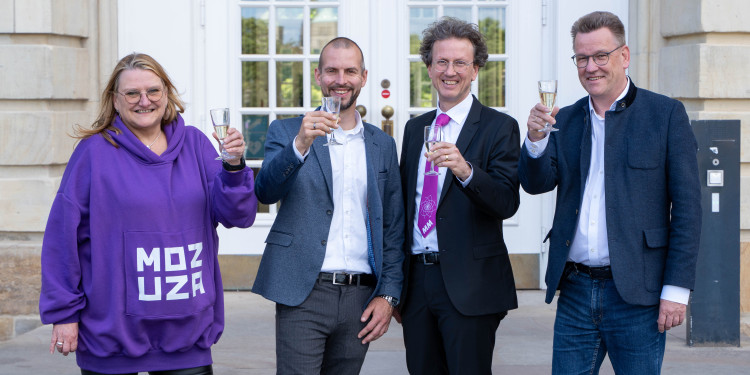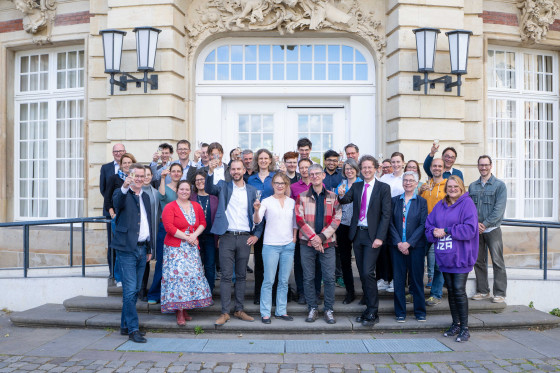
Funding for the “Mathematics Münster” Cluster of Excellence
In the first funding line of the Excellence Strategy being pursued by the federal and regional state governments, the decisions have been made concerning the new Clusters of Excellence. The German Research Foundation (DFG) and the German Science and Humanities Council (WR) announced yesterday (Thursday, 22 May) that the “Mathematics Münster” Cluster of Excellence at the University of Münster will be receiving funding for another seven years, from 1 January 2026. “Funding for the Cluster of Excellence is not only a significant milestone for mathematics research at Münster,” says Rector Prof. Johannes Wessels. “It is also a testament to the unremitting commitment, excellence and passion shown by our researchers. This recognition fills us with pride and will motivate us to continue working together on finding solutions to the challenges of our times – and in surroundings which promote creativity and top-level international research.”
In the same meeting, it was decided to discontinue funding for the “Religion and Politics” Cluster, which has been running for 18 years. “Over the years, the Religion and Politics Cluster of Excellence has produced internationally acclaimed research work which is making an important contribution to understanding complex social issues,” says Prof. Monika Stoll, Vice-Rector for Research. “It is a matter of regret that there will not be any more funding. However, this does not spell the end of the successful work done by this Cluster. We are determined to push forward with work in this field. The findings and the progress made will be incorporated into the consolidation of our research activities.” The decision also means that the University of Münster cannot apply to receive the title of University of Excellence in the second funding line of the Excellence Strategy because, for this, a university needs to have at least two Clusters of Excellence.
The Excellence Commission selected 70 applications for funding from a total of 98 – these include 45 clusters that have already received funding and 25 new clusters. They will receive around €539 million per year in funding for seven years starting in 2026.
Information on the Clusters of Excellence
“Mathematics Münster: Dynamics – Geometry – Structure”

Over the past few years, the team has achieved some internationally acclaimed breakthroughs, making the University of Münster now one of the most dynamic places for mathematics in Germany. The findings made are also important for other fields of science and technology, in particular for artificial intelligence and medicine. Fundamental to this success is the excellence of the Cluster’s members – documented by prestigious awards such as an Alexander von Humboldt professorship, six ERC grants and five Leibniz awards.
In the second funding period, and in ten networked research axes, Münster will be positioning itself with a research programme dedicated to current challenges from the fields of ‘invariants and fundamentals’, ‘non-linear spaces und operators’ and ‘models, approximations and data’. “Our second success with an application is a fantastic acknowledgement of the work being done by our 200-strong team,” says Mario Ohlberger. “This funding,” Thomas Nikolaus adds, “will continue to make our masters, PhD and postdoc programmes a magnet for outstandingly talented mathematicians from all over the world.” What is also being planned, they say, is the establishment of new professorships to advance the integrative approach.
Mathematics Münster is working together with several Collaborative Research Centres, Research Training Groups and interdisciplinary research centres. In early 2027, the Centre of Mathematics Münster (CMM) will be opened – a modern research centre which will consolidate Münster’s role as a driving force for international mathematics research.
“Religion and Politics”
Exploring the changing relationship between religion and politics across epochs, cultures, and geographical regions of the world, the “Religion and Politics” Cluster of Excellence has,, since its establishment in 2007, made the University of Münster an international hub for outstanding interdisciplinary research on religion. The Cluster received funding of 112 million euros in total from 2007 onwards, and more than 25 disciplines in the humanities, law and social sciences were involved in its work. In order to embed research on religion in all its breadth and diversity, the University has decided to continue developing “Religion and Society” as a Profile Area.
“Having been established in the first funding phase of the Excellence Initiative, our Cluster of Excellence has existed longer than most other Clusters of Excellence,” says the Cluster’s spokesperson Prof. Michael Seewald. “I very much regret that we will not be able to enter a fourth funding period. Nevertheless, interdisciplinary research on religion will remain a strong feature at the University of Münster. The past 18 years have seen studies conducted in Münster permanently shape international research on religion. We will be using the planned Campus for Theology and Religious Studies to pursue our work in new formats and with fresh ideas”.
This new Campus for Theology and Religious Studies will be bringing together, under one roof, Protestant, Catholic and Islamic theology, as well as religious studies, and will be housing one of the largest research libraries on religion in the world. It is due to open in 2026.
Emerging from the Cluster of Excellence, many permanent institutions have also been established at the University of Münster, such as the Centre for Religion and Modernity, the Institute for Jewish Studies, the Centre for Islamic Theology, and the Service Centre for Digital Humanities. These will continue their specialist research on religion and politics, as well as their focus on science communication, for example with the training programme “Journalism on Religion”, and will help establish new networks.
Further indications of the successful work done at the Cluster are the projects it spawned such as “Asking the Pope for Help”, the Edition of the Complete Works of Ibn Nubātah al-Miṣrī (German Research Foundation), and the Käte Hamburger Kolleg “Legal Unity and Pluralism”.
The Excellence Strategy
The aim being pursued by the federal and regional state governments with their Excellence Strategy is to permanently strengthen Germany as a research location and further improve its international competitiveness. There are two funding lines:
The Cluster of Excellence funding line bolsters outstanding fields of research at universities or university research alliances which, as big high-performance centres, are networked both nationally and internationally, collaborating with a variety of partners. The Clusters receive funding of between three and ten million euros a year, over a period of seven years. There are currently 57 Clusters of Excellence receiving funding, and the new funding period begins on 1 January 2026.
The aim of the Universities of Excellence funding line is to permanently strengthen universities as individual institutions or as university research alliances, as well as to further develop their leading international positions in research. In order to be eligible to submit an application in this funding line, a university must have at least two Clusters of Excellence. Every seven years they must provide evidence that they can continue to fulfil the funding requirements. Decisions on funding are taken in 2026, with the funding itself commencing on 1 January 2027.
